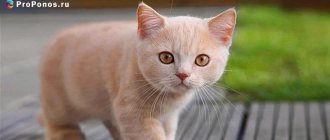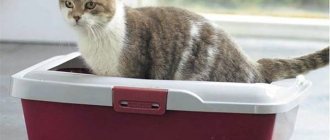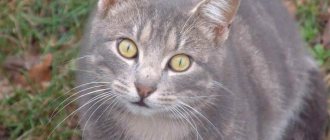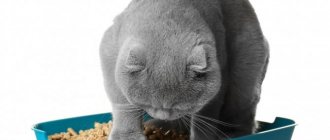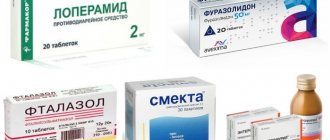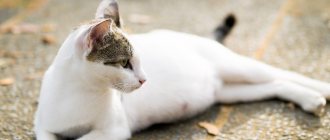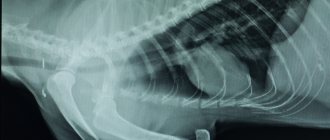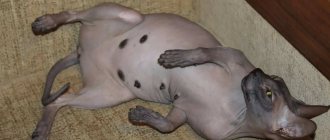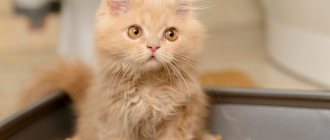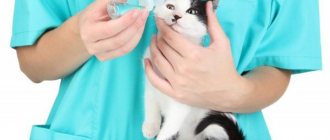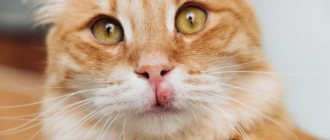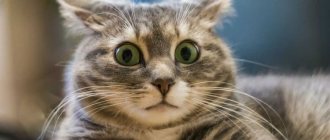When to contact a veterinarian
Diarrhea in cats should be treated by a veterinarian, especially if the diarrhea lasts more than 24 hours and is accompanied by the following clinical picture:
- increased body temperature;
- weakness;
- pain in the abdominal area;
- frequent vomiting;
- impurities of blood and mucus in the stool;
- fetid odor of decomposition from feces;
- nervous phenomena.
If the cat can drink water on its own, then before sending it to the clinic or visiting a veterinarian, you need to provide it with plenty of fluids.
How are the causes of diarrhea identified?
To prescribe the correct treatment at home, a veterinarian must identify the causes of diarrhea in the cat. Diagnostic tests include:
- examination and collection of anamnestic data;
- detection of parasites in feces using flotation, specific staining and PCR;
- general and biochemical blood test;
- determination of the amount of pancreatic and thyroid hormones (if necessary);
- Ultrasound of the abdominal organs;
- endo- and colonoscopy.
To determine the type of tumor, a veterinarian will order a biopsy.
The cat has yellow diarrhea
global $ads_google; //data-ad-slot=”2475549904″ $ads_google = empty($ads_google) ? false : true; ?> if ($ads_google == false) {?>
$ads_google = true; ?> } ?>
Yellow diarrhea in a cat without signs of orange is considered normal, since bilirubin in bile is processed into brown stercobilin, and with loose stools, bilirubin may not be completely processed. But bright yellow or yellow-orange stools indicate jaundice or poor absorption of foods. Having analyzed the cat’s menu of the last few days, and noticing that there was a lot of milk, raw seafood, liver, and fatty meat, they urgently change the pet’s diet. If a half-starvation diet does not produce results, the cat is shown to a specialist.
How to treat
If the cause of yellow diarrhea in a cat is overfeeding or a reaction to new food, then you can do home treatment. But this can only be done if the cat’s condition does not cause concern. Home treatment consists of supervision - the cat’s condition must be kept under control, and the younger the pet, the more dangerous loose stools are. Dehydration can kill a kitten very quickly. Access to clean boiled water is required.
Since bilirubin is an aggressive substance, after each bowel movement you need to wash the dirty area around the anus with warm water and soap.
If yellow diarrhea is the result of overfeeding, then the cat is offered a tablespoon of pumpkin puree 2-3 times a day. You can use ready-made baby puree.
How and with what to treat a pregnant and lactating cat for diarrhea: tips, list of medications
Diarrhea medications for pregnant cats
Diarrhea in a cat during pregnancy can cause quite serious consequences. If you fail to restore proper functioning of the gastrointestinal tract in the shortest possible time, this can lead to spontaneous abortion. In view of this, if you see that your pet’s condition does not return to normal after 3 days, then you should definitely see a veterinarian.
But even during these three days you should be as attentive as possible to your pet. If the diarrhea is very severe, then dehydration will begin earlier and, as a result, she may go into premature labor. For this reason, it will be better if during the day you periodically check whether too much fluid has left the body. To understand this, it will be enough to touch the cat’s gums.
If they are completely dry, then it’s time to immediately run to the clinic. And remember that only a veterinarian can prescribe antibiotics in this case. Therefore, if you decide to treat your pet at home, then give him only safe medications and clean water. It could be Activated Carbon or Enterozoo .
Diarrhea medications for pregnant cats:
- Probifor (will help restore microflora)
- Nifuroxazide (antibacterial agent)
- Stop cystitis (will restore the functioning of the kidneys and urinary system)
- Drontal (an effective dewormer)
Diarrhea in a pregnant cat
global $ads_google; //data-ad-slot=”2475549904″ $ads_google = empty($ads_google) ? false : true; ?> if ($ads_google == false) {?>
$ads_google = true; ?> } ?>
During pregnancy, a cat is susceptible to attack by viruses and bacteria. Any invasion of a microscopic enemy into a cat’s body can give rise to intestinal problems.
During pregnancy, you should not experiment with new food on the cat’s menu, as there is a chance of stumbling into an intolerance to some product. These can be dairy products, beef, horse meat, soy, fatty fish, chicken eggs.
The body of a pregnant cat can react with diarrhea even to previously easily digestible food.
If the cat always seems hungry when the feeding rate is appropriate, and the compassionate owner decides to feed her more, diarrhea may occur. A large amount of food is not digested, but quickly moves through the intestines in the form of liquid gruel.
Loose stools early in pregnancy can cause miscarriage. Two days before giving birth, diarrhea in your cat is normal and not something to worry about.
If your cat's diarrhea is green
global $ads_google; //data-ad-slot=”2475549904″ $ads_google = empty($ads_google) ? false : true; ?> if ($ads_google == false) {?>
$ads_google = true; ?> } ?>
Diarrhea in cats can also be green in color. Such diarrhea is the result of putrefaction and fermentation in the intestines. The cause is often rotten food, because it contains a lot of microorganisms. Due to decay processes, many toxins appear in the body, and poisoning develops. The entire body will suffer from toxic substances, and if the cat’s diarrhea continues for several days, then a veterinarian’s examination is required. The usual treatment is antibiotics and IVs.
How to deal with diarrhea at home
Treatment of diarrhea in cats is the same as in children or adults, depending on the cat’s well-being. If diarrhea does not affect the cat’s mood, he is active and feels hungry - an adequate measure would be a fasting day - with a change in the usual menu or fasting.
If diarrhea lasts longer than a day, you cannot do without medication. If there is a strong odor and unusual color, you should consult a veterinarian, because many diseases, in particular distemper, begin with diarrhea, and delay will be fatal for the pet.
Causes and treatment of types of diarrhea of different consistency and color
1. Watery discharge
Usually they are of a frivolous nature. To normalize stool, replace the water with boiled water (you should not give your cat water from the tap at all). It happens that purified water causes short-term dysbiosis and provokes diarrhea. Try to keep your cat from having a hungry day. Be sure to drink to prevent dehydration. If the cat does not drink on its own, pour water into its mouth through a syringe.
2. Diarrhea + vomiting
This is a sign of poisoning, intestinal obstruction. Vomiting is an indicator that toxins have been absorbed into the blood. They can enter the intestines with low-quality products or due to the activity of worms. Pancreatitis, kidney disease and tumors can cause diarrhea with vomiting.
How to cope?
Be sure to replace the water with boiled water.
After a daily fast, feed your cat canned food for cats with gastrointestinal diseases. This food normalizes feces, absorbs toxic substances and soothes the intestinal and stomach mucosa.
3. Diarrhea with blood or mucus
A common cause of such diarrhea is unsuitable food or the presence of worms. The intestinal walls are irritated, and diarrhea lasts for 5-7 days. Be sure to give your cat clean water and give him coal or smecta. Consider the dosage. 1 tablet of coal is designed for 10 kg of weight. 1 sachet of smecta - spread over 3-4 doses. It should be given until the stool returns to normal. Limit the variety of your cat's diet, especially that of a kitten. Feed him only food or add a little of your food - but not all at once. Avoid milk, but cottage cheese and kefir are ok - they contain bifidobacteria, which normalize the balance of bacteria in the intestines. Look at the situation - each cat’s body is individual.
If worms are present, deworming is mandatory.
4. Black or red diarrhea
An alarming symptom indicating the presence of blood in the stool. This may be due to severe irritable bowel disease, but often it is a symptom of peptic ulcers, gastritis, and tumors. As a rule, in this case the cat withers away. It is advisable to take the animal to a veterinarian for diagnosis and treatment.
5. Yellow diarrhea
Speaks of nutritional imbalance or hepatitis. Try to exclude fatty foods, milk, seafood. If the situation does not change, a specialist’s diagnosis cannot be avoided.
6. White diarrhea
A sign of blockage of the bile ducts by stones or cysts. You definitely need the help of a specialist!
7. Green diarrhea
It indicates that stagnation and rotting of food occurs in the stomach. Required - smecta and gentle nutrition. It would not be amiss to introduce fermented milk products. In the future, do not overload the cat's stomach.
Home first aid kit: treatment of diarrhea with drugs
1. Furazolidone is an antimicrobial medicine. Add to food and give the daily dose in three doses.
2. Phthalazol - against microbes. Not recommended for cats with kidney and liver diseases. A quarter of the tablet is mixed with water and given through a syringe.
3. Levomycetin - suppresses pathogenic flora. Be sure to follow a strict dosage.
4. Smecta and coal. The dosages are described above. Before you start taking antimicrobial agents, try giving smecta - it often copes with diarrhea.
Symptoms and diagnosis
Diarrhea is loose stool that is hard to miss. Suffering from diarrhea, a cat goes to the toilet more often and licks itself more thoroughly. By the way, you need to be able to distinguish real diarrhea from false one. In the second case, the cat is constipated, not feces, but mucus comes out of the anus, and the cat strains very hard. When it comes to a nursing cat, it is better not to engage in self-diagnosis and self-medication, but to draw up an anamnesis, you still need to know the basic theory.
Depending on the speed of development of the disease, acute and chronic diarrhea are distinguished. If we are talking about poisoning, the course will be acute, but if diarrhea is a symptom, the condition may drag on for five or more days. Regularly recurring diarrhea is called recurrent and in this case a doctor should be involved in determining the cause. In the clinic, the veterinarian conducts an initial examination, which includes:
- General assessment of condition.
- Measurement of body temperature, assessment of respiratory and cardiac activity.
- Feeling the peritoneum (palpation).
- Assessing the degree of dehydration.
- Tests and examinations if the situation raises doubts or concerns.
Deciding what to do next—whether to wean kittens off milk or not—depends on the severity of the condition. First of all, the degree of dehydration is taken into account and if it seems threatening, intravenous (or subcutaneous) fluid infusions are started. The prescription of medications depends on the general symptoms, which include the color of the stool:
- clear mucus comes out of the anus , the reason may be constipation or too active bowel movements, which can be caused by a number of reasons.
- Yellow and green color of stool indicates severe indigestion or rotting of food debris in the intestines.
- Orange or whitish colors indicate problems with the liver, bile ducts and bladder.
Special dry food
In case of stool upset, the animal is temporarily transferred to dietary wet food in the form of pate, jelly, stew, and canned food. Dry granules damage inflamed mucous membranes of the gastrointestinal tract; in the first days it is better to soften them in cold water. Veterinary lines combine dry and semi-liquid food in cans and pouches. The composition includes easy-to-digest components.
The following foods are suitable for the diet:
- Hill's Prescription Diet I/D is prescribed for gastrointestinal diseases that are accompanied by diarrhea. The product is available in 2 versions: chicken and salmon based. The minimum duration of the diet is 1 week.
- Royal Canin Gastro Intestinal moderate calorie combines highly digestible LIP proteins, rice, prebiotics, beet pulp, fish oil. Use from 3 weeks.
- Purina EN is created on the basis of dry soy and poultry protein, corn starch, and animal fat. The cat is fed for 1–2 weeks until recovery.
- Eukanuba Intestinal is made from freeze-dried chicken and turkey meat and contains a complex for restoring microflora: natural beet fiber, prebiotics. The food is used for 7–14 days to stop diarrhea, and up to 12 weeks to restore digestion.
- Farmina Vet Life Cat Gastrointestinal is recommended to be given as prescribed by a veterinarian from 7 days to 3 months. The product is made from dehydrated chicken meat and rice. The composition contains components to restore intestinal function after diarrhea: soluble fiber, omega-3, psyllium seeds, prebiotics, vitamin complex and electrolytes.
Manufacturers recommend following the daily diet:
| Name | Cat weight, kg | Daily value, g |
| Royal Canin | 2 | 34 |
| 3 | 46 | |
| 4 | 56 | |
| 5 | 66 | |
| 6 | 75 | |
| 7 | 83 | |
| 8 | 92 | |
| 9 | 100 | |
| 10 | 107 | |
| Hills | 2 | 30–40 |
| 3 | 40–55 | |
| 4 | 50–70 | |
| 5 | 60–85 | |
| 6 | 70–95 | |
| 7+ | 11–13 per kg | |
| Purina Pro Plan | 2–3 | 30–45 |
| 3–4 | 45–60 | |
| 4–5 | 60–75 | |
| 5+ | 15 per kg | |
| Eukanuba | 2 | 30–40 |
| 3 | 40–60 | |
| 4 | 55–80 | |
| 5 | 70–100 | |
| 6 | 85–115 | |
| 8 | 110–155 | |
| 10 | 140–195 | |
| Farmina | 2 | 25–40 |
| 2,5 | 28–45 | |
| 3 | 32–50 | |
| 3,5 | 35–55 | |
| 4 | 38–65 | |
| 4,5 | 40–70 | |
| 5 | 45–75 | |
| 6 | 50–85 |
The daily diet is divided into equal portions and the pet is fed 3-4 times a day.
Treatment of cats and kittens for diarrhea at home
global $ads_google; //data-ad-slot=”2475549904″ $ads_google = empty($ads_google) ? false : true; ?> if ($ads_google == false) {?>
$ads_google = true; ?> } ?>
First of all, don't panic. You should especially not start worrying if the animal is vaccinated and has not come into contact with dubious feline personalities. We remember that the main thing is to assess the condition and find out the causes of diarrhea in the cat.
You should be aware that home treatment with proper nutrition may not be effective in serious cases. Such severe ailments require medical intervention. However, there are a number of medications that are effective in treating the symptoms of bowel disorders, some of which are used in human treatment.
Medicines and dosage for diarrhea in cats
Despite the extensive list of drugs that can help a meowing sufferer with an intestinal disorder, not all of them are recommended by specialists. Any medicine is not a panacea, and in difficult cases, eliminating symptoms is simply dangerous for the cat’s life.
Here is an approximate list of effective remedies for diarrhea in cats:
Enterofuril is an effective broad-spectrum antimicrobial drug. The medication does not disturb the intestinal flora, so the rapid effect of enterofuril does not carry with it any side effects for the intestines. The medicine is excellent in treating feline diarrhea if the cause is bacterial infections, but viral stool disorders can also be treated. The price for enterofuril varies from 270 to 350 rubles; The dosage of the suspension for adult cats is 100 milligrams. For kittens 5 times less; Give 2-3 times a day, 12 or 8 hours apart; If over the last 10-12 hours the signs of diarrhea disappear, then the drug is stopped;
Diarcan is a medicine that is dissolved in water and offered to the pet to drink or added to the food. If the situation does not improve within 5 days, the drug is discontinued, since the diarrhea is not due to infection. The dosage is strictly observed, half a cube for cats up to 5 kg and a cube over. There is an 8-hour break between doses. The drug costs about 500 rubles; Furazolidone is an antimicrobial drug that is effective due to the fact that bacteria develop resistance to it poorly. Treatment of loose stools with this remedy should be prescribed by a doctor who will select the correct dosage regimen. Typically, the daily dose is divided into three parts, each third mixed with food. Furazolidone can be bought for an average of 100 rubles; Bifidumbacterin is a probiotic that normalizes the functioning of the gastrointestinal tract. The product is sold in the form of tablets, powder and suppositories. Bifidumbacterin is indicated for long-term viral diseases of the cat and during a course of treatment with antibiotics. The cost of the probiotic depends on the dosage, but for cats the price will be approximately 100-200 rubles; Smecta and activated carbon are enterosorbents that remove toxins from the gastrointestinal tract. If the bowel disorder does not last long, then the cat can be given smecta to drink. The price for smecta enterosorbent is 130-150 rubles; Enterosgel - the drug actively cleanses the cat’s body of toxins, helps with poisoning, intestinal infections and after antiparasitic treatment
It would be better if a specialist prescribes such a remedy for your pet, because it is important not only to relieve the symptoms of the disease, but also to find the cause. Phthalazole is an antimicrobial medicine. Even salmonella is repelled from this medication
The remedy has been proven for weakening the intestines by more than one generation of mustaches. The tablet must be crushed, mixed with water and offered to the animal in a syringe. There are contraindications for use. The price of tablets is 30-40 rubles; Loperamide - a tablet is a savior, but not a cure. The symptoms of diarrhea will disappear, but the cause will remain. Loperamide is excellent at removing bacteria and parasites from the body, but it is worth consulting with a qualified specialist. Loperamide costs 15-30 rubles; Levomycetin is a strong drug that neither gram-positive nor gram-negative microorganisms can resist. Side effects will not appear if you follow the instructions and dosage. Otherwise, skin rashes, flatulence, and dermatitis may appear. The drug is contraindicated for pregnant cats or animals with kidney and liver diseases.
Now it’s clear what can be given to a cat for diarrhea, but you shouldn’t blindly hope for miraculous remedies, since the cause is sometimes difficult to establish. The cause of the disease is the main thing worth fighting. The veterinarian will not only help you find the cause of the bowel disorder, but will also prescribe a competent course of treatment.
How to treat diarrhea?
Diarrhea in a nursing cat may be a consequence of stress experienced by the animal's body. Often, diarrhea caused by this factor does not last more than two days, while no other symptoms are noted.
Vomiting and diarrhea may indicate that the animal is overeating. Most owners try to feed their pet well in the first days after birth so that she has milk, but this should not be done. The body, weakened by childbirth, is not able to normally process large volumes of food, so with your excessive care, you can only do harm.
In a cat after giving birth, diarrhea is caused by an allergy to a food product or feed. After lambing, the pet’s sensitivity may increase, and accordingly, non-standard reactions develop that were not observed before. That is why you should not change the food or add dairy products to the mother cat’s diet; large amounts of lactose most often provoke diarrhea.
The immune system of animals is depleted during the postpartum period, because the mother passes all the necessary microelements and vitamins to the child with milk, leaving very little left to protect her body. Accordingly, during the postpartum period, the pet is more susceptible to microbial attacks. Loose stools in a nursing cat can be caused by one of the viral or infectious diseases; often this pathology is accompanied by an increase in body temperature, vomiting, change in the color of feces, apathy, and flatulence. A veterinarian can accurately determine the cause of stool disorder, so do not hesitate to visit him.
In order to prevent negative consequences, if diarrhea lasts more than 24 hours, you should take the animal to the veterinarian for a quality diagnosis and prescribing the necessary drug therapy.
- During the first day, symptoms of diarrhea in a nursing cat can be eliminated at home using rice water. This folk remedy helps strengthen feces and normalize the functioning of the gastrointestinal tract. However, no consequences for the mother and kittens are observed.
- Smecta has a good effect on the patient’s well-being. It has no side effects, so it is approved for use by nursing pets. You need to dilute a sachet of the drug in 50 ml of water and, using a syringe without a needle, inject it into the animal’s mouth twice a day.
- If you are sure that your cat’s diarrhea after giving birth is caused by overeating or poisoning, you can give Enterosgel (1 tsp 2 times a day) and crushed activated carbon (1 tablet per 100 g of water). The above manipulations should have an effect within 24 hours.
If during this time the pet’s well-being has not changed, it is better not to experiment with its health and go to the veterinarian. Based on the research, the specialist will tell you what to give a nursing cat for diarrhea, and may also prescribe broad-spectrum drugs, for example, Trichopolum or Metronidazole.
The dosage of both medications is 5 mg. per 1 kg of weight. These medications are active in the fight against viral and bacterial infectious diseases, intestinal disorders and dysbiosis. They also have a therapeutic effect for mild parasitic infestations, however, when a cat has diarrhea after giving birth, these drugs must be used with extreme caution, only with the permission of the treating specialist.
The health of little kittens directly depends on the well-being and nutrition of their mother. Only the owner's care and careful observation of the cat's behavior during lactation will help raise strong cats. If your pet refuses to eat, her temperature rises, vomiting appears, mucus comes out of the anus and a nursing cat experiences diarrhea, don’t think twice about what to do, immediately seek help.
We invite you to read: American Bulldog (Ambul): description of the breed, photos and care
Useful materials:
- Diarrhea in a cat General information It is known that normal cat stool is light brown in color and has a fairly soft consistency. Tough...
- The cat has cancer Stages of mammary gland cancer in cats Like in humans, cat mammary cancer has ...
- Cat's eye Causes and signs of various types of eye diseases in cats Cats have many eye diseases. Necessary…
General information
So, diarrhea is the process of emergency removal of semi-digested food and already feces into the external environment. Everyone knows about this. But why can this happen to a cat that has barely given birth to kittens? There are a lot of possible reasons. But first, let's look at the main predisposing factors.
What do you think every cat loves? The answer is almost obvious - everyone thinks that these animals cannot live without fish and fresh milk. And this opinion, suddenly, is completely untrue. Fish, in particular, contains thiaminase. This is an enzyme that destroys vitamin B1. Frequent feeding of raw fish leads to nervous attacks... but not to diarrhea.
This is exactly what is fraught with giving milk to an adult cat. Especially cow's. The lactose it contains is practically not digested in the animal’s gastrointestinal tract. But on many thematic forums there is “valuable” advice that a cat that has given birth supposedly definitely needs milk! Yes, there is some truth in this. Your pet's body needs a lot of calcium during this period, and there is really a lot of it in milk.
But it would be much wiser to give your pet multivitamin preparations, after consulting with a veterinarian. What will happen to the cat after milk? Since it is not properly digested in its gastrointestinal tract (in about 70% of adult cats), fermentation processes quickly begin, the semi-digested mass curdles and becomes a “delicacy” for bacteria. The natural result is diarrhea. Especially after childbirth, when the animal’s body is already greatly weakened by stress.
Treatment methods
If a cat has diarrhea 3-4 times a day, but there is no vomiting, no fever, lethargy or other symptoms, the owner should put the pet on a starvation diet. For a whole day (but no more), the animal does not need to be given any food, and at home bowls with clean water should always be full.
During the diet, the cat should be given crushed activated carbon mixed with boiled water twice a day (half a tablet should be given per 5 kilograms of the animal’s weight). Also, at home, you can pour Smecta, chamomile decoction, oak bark infusion or rice decoction into the sick animal’s mouth using a syringe. But giving a sick animal a drug such as Loperamide (a human antidiarrheal drug) is not recommended.
When the cat's diarrhea stops, you should not load its stomach and at first feed only light diet food. After fasting, the animal can be given boiled rice, boiled chicken, and boiled egg yolks in small portions. You can also offer your cat a special medicinal dietary food (it’s better to start with dry food).
If the diet does not produce results, and diarrhea continues for more than a day, you need to take your pet to the doctor. You should also seek medical help and begin prompt treatment in the following cases:
- when a cat develops severe weakness, fever, vomiting, and convulsions along with diarrhea;
- if the animal has diarrhea with mucus or blood;
- if the stool has an unpleasant, foul odor;
- if the cat defecates constantly and too often (more than 5 times a day);
- if the cat completely refuses water;
- if diarrhea occurs in a pregnant cat;
- if diarrhea occurs in a nursing cat after giving birth.
As soon as the owner delivers the pet to the clinic, the veterinarian will be able to conduct the necessary tests, establish the diagnosis and causes of the disease, and prescribe treatment:
- to eliminate dehydration, the doctor may prescribe intravenous saline solutions;
- if diarrhea is caused by a bacterial infection, you will need to take antibiotics; for microbial infections, doctors often prescribe Enterofuril to animals (this medicine can be given to a cat even after birth or sterilization, Enterofuril copes well with diarrhea without causing complications);
- to quickly eliminate stomach upset, the doctor will prescribe sorbents for the animal (Smecta, Enterosgel, etc.);
- In case of helminthic infestations, the cat will need to be treated with anthelmintic drugs (these can be either tablets or suspensions).
How to determine the cause of diarrhea
First you should observe the animal and analyze the situation. The appearance of digestive problems may be associated with the introduction of new products to the menu, the use of household chemicals, or the stress of moving.
In the case of isolated failures, most often the culprit is a relatively harmless cause. You should be concerned if your cat experiences diarrhea more than once a week, and if the stool has an unusual consistency.
The appearance of the discharge will help indirectly determine the source of the problem. Depending on the type of deviation, it may be as follows:
- Green. Most often observed during putrefactive processes and poisoning.
- Yellow. Indicates a violation of food digestion: slow movement of masses through the intestines and inflammation of the small part.
- Orange. This color of stool can appear due to dysbacteriosis, accelerated movement of stool through the intestines and liver diseases. In the latter case, the change in shade is associated with increased bilirubin synthesis.
- White. Indicates a lack of bile to color stool brown. The cause may be blockage of the pathways.
- Red. It is observed with inflammation of the large intestine.
- Light brown. A relatively harmless deviation, indicating a rapid removal of masses from the intestines.
- Black. This type of stool contains digested blood. Since the substances have time to coagulate, the problem should be looked for in the upper parts of the stomach. The cause may be an ulcer.
- With mucus and foam. Uncharacteristic discharge appears during acute inflammation.
- With blood. Occurs when the mucous membranes are damaged. If your cat has had diarrhea for a long time, the leak may be due to irritation. In other cases, the cause may be infection, colitis, etc.
In cases of severe helminthic infestation, helminth eggs and fragments may be found in feces. To determine the cause of diarrhea, you need to have your cat's stool tested.
Laboratory technicians can detect bacteria, protozoa, helminths, etc. in stool.
In some cases, additional examinations are required: blood tests, ultrasound or x-rays.
Dependence of diarrhea on the physiological state of the animal
It often happens that diarrhea appears in an animal at a certain time, when the pet’s body, for some reason, cannot adequately resist negative environmental factors. In many cases, diarrhea does not pose any particular danger, but in others it needs to be stopped urgently before its dangerous consequences develop.
Diarrhea in a pregnant cat
A very important and even dangerous period in the life of any cat is the time of bearing offspring. If anything in her body goes “wrong,” the consequences can be extremely severe. And diarrhea is just a reflection of “problems.” True, in many cases everything is explained quite prosaically:
Although less common (compared to humans), cats can also develop pregnancy intoxication. Accordingly, this pathology may well be accompanied by diarrhea.
In addition, the body of pregnant pets becomes extremely sensitive to any changes in diet.
Finally, at the same time, the likelihood of food allergies, as well as individual intolerance to some food components, becomes very high.
We must also not forget that if there are parasitic worms in a cat’s body, the effect of their toxins and other harmful substances increases dramatically. This can also lead to diarrhea.
Finally, any chronic diseases also sharply worsen during this period. This is especially true for diseases of the digestive system.
Of course, the body of a pregnant cat is much more sensitive to all infectious pathologies, which can also cause digestive disorders.
Diarrhea immediately after childbirth
The reasons may be the same factors that have already been described above. But! One of the main causes of diarrhea during the postpartum period is the cat eating the placenta. This phenomenon in itself (i.e., eating the placenta) is completely normal, but not every cat’s digestive system can digest it normally.
Diarrhea in a nursing cat
Most likely, diarrhea in a nursing cat is caused by stress and irregular nutrition of the nursing mother. At this time, the pet rushes to the kittens whenever they squeak, and therefore simply does not have time to eat normally. It should be borne in mind that diarrhea in such conditions leads to the rapid development of dehydration. The latter, in turn, leads to either a lack of milk or its complete absence.
In addition, it is useful to place the bowl of food close to the basket with the kittens. When a cat can constantly keep her offspring in sight, she will become much calmer and eat better.
